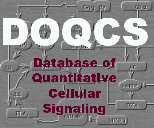
|
Enter a Search String | | Special character and space not allowed in the query term.
Search string should be at least 2 characters long. |
Molecule List for pathway CaM (Pathway Number 122) in Accession Osc_Ca_IP3metabolism (Accession Number 24) | Default ordering is done according to Pathway Number. Table headers can be used for changing the default ordering.
  arrow indicates that ordering is done according to ascending or descending order. arrow indicates that ordering is done according to ascending or descending order.
The entries are grouped according to Pathway Number and are alternately color coded using  and and  color. color. |
| |
Name | Accession
Type | Initial
Conc.
(uM) | Volume
(fL) | Buffered | Sum Total Of | | 1 | CaM-TR2-Ca2 | Network | 0 | 0 | No | - | | | This is the intermediate where the TR2 end (the high-affinity end) has bound the Ca but the TR1 end has not. | | 2 | CaM-Ca4 | Network | 0 | 0 | No | - | | | The four-calcium-bound form of CaM. It is the active form for most reactions. | | 3 | CaM-Ca3 | Network | 0 | 0 | No | - | | | The TR1 end now begins to bind Ca. This form has 2 Ca's on the TR2 end, and one on the TR1. | | 4 | CaM | Network | 20 | 0 | No | - | | | LOT of this present in the cell: upto 1% of total protein mass. (Alberts et al, Mol Biol of the Cell, Garland Publishers) says 25 uM. Meyer et al, Science 256; 1992: 1199-1202 refer to studies saying it is comparable to CaMK levels. (Kakiuchi et al, J Biochem 92; 1982; 1041-48) say conc in cerebral cortex & cerebellum homogenates: 20-30uM Lower conc in other tissues: lung, adrenal gland, liver, kidney, spleen = 6,5,5,3,2 uM respectively |
| Database compilation and code copyright (C) 2022, Upinder S. Bhalla and NCBS/TIFR
This Copyright is applied to ensure that the contents of this database remain freely available. Please see FAQ for details. |
|
